This report is intended to be a fairly brief overview of only the UK responses from this year’s Gender Census. For an international report with a lot more detail, click here.
This year’s Gender Census, aimed at everyone whose gender(s) or lack thereof are not adequately described by the gender binary of “always, solely and completely male OR always, solely and completely female”, was open from 12th February until 7th April 2020.
There were 24,576 usable responses, of which 3,089 were from the UK. You can see the spreadsheet of only the UK responses here. In all cases below, the worldwide statistics include UK reponses.
Q1. Identity words
As usual, I asked: Which of the following best describe(s) in English how you think of yourself? Participants were invited to choose from a checkbox list of 30 words or phrases, and then given textboxes to type in up to 5 more words and phrases.
Here’s our top 10:
- nonbinary – 61.7%
- queer (partially or completely in relation to gender) – 39.8%
- trans – 30.6%
- enby – 27.1%
- transgender – 26.3%
- genderqueer – 23.6%
- gender non-conforming – 23.0%
- agender – 19.0%
- genderfluid/fluid gender – 17.9%
- transmasculine – 16.2%
Here’s how that looks as a graph:
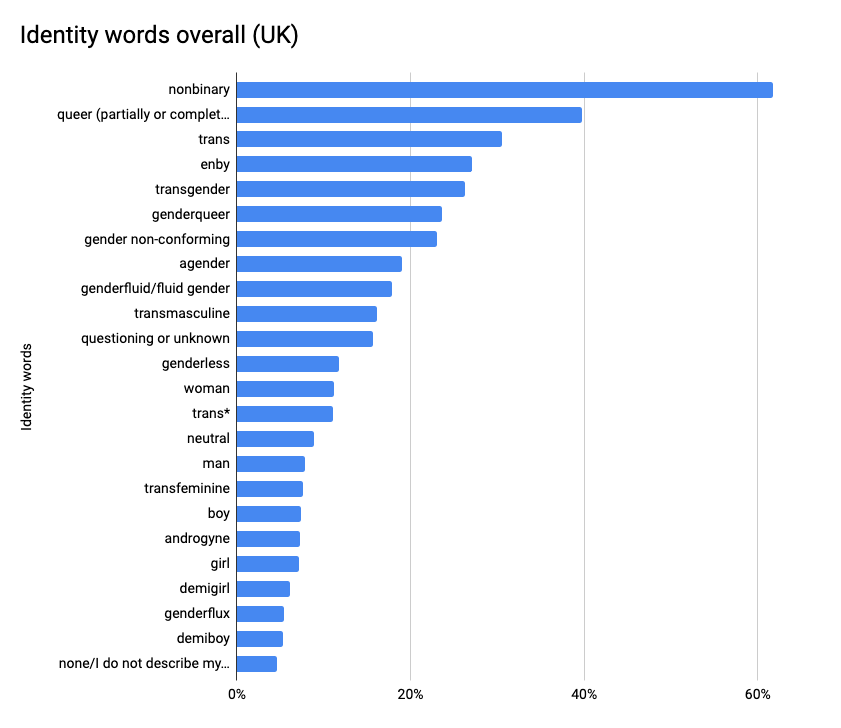
And here’s a graph comparing the top 15 UK and worldwide identity words:
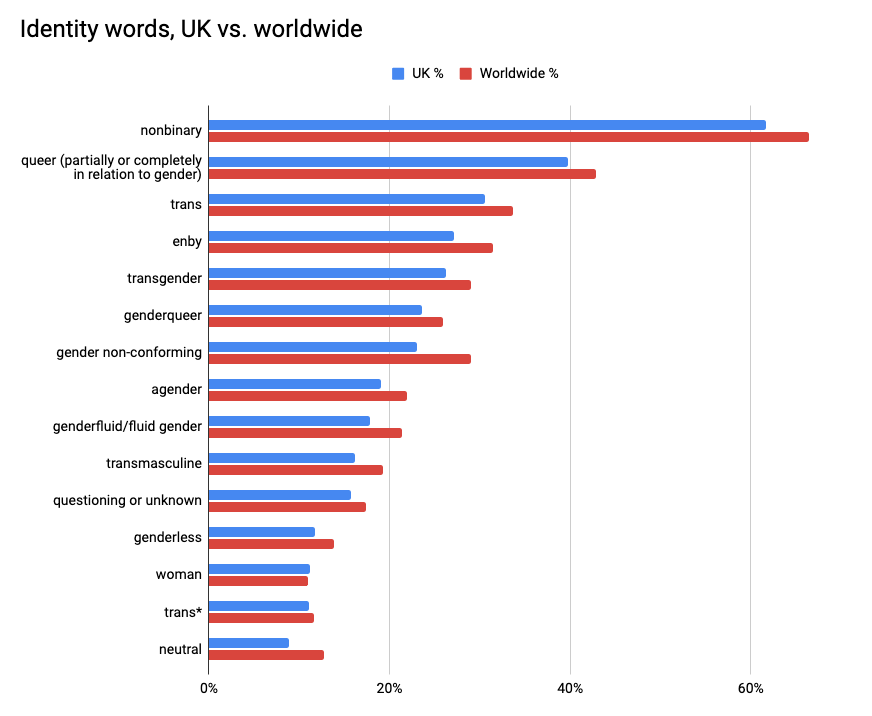
The top 15 was the same set of words internationally and in the UK, and the order was almost the same too, but gender non-conforming and neutral were a little less popular in the UK compared to worldwide, pushing them further down the list.
I also noticed that there is a bigger gap in preference for the word queer between under-30s and over-30s in the UK compared to worldwide. Over-30s are 8.4% less likely to identify as queer in the UK, but worldwide it’s about the same for each age group, and in fact the over-30s are a little more likely to identify as queer. I have two speculative reasons to propose for this:
- I suspect that perhaps queer has been used as a slur more (in terms of frequency and violence) in the UK, especially towards LGBT+ people in older generations. Homophobia is less common in recent years, so younger LGBT+ people may not have been subjected to violence in association with the word queer, and so may be more likely to feel comfortable claiming it and using it in an unstigmatised way.
- Words hold less emotional resonance in one’s second language, and international participants are more likely to speak English as a second language.
The most noticeable overall trend is that most of the top 15 words were chosen more often internationally. Here in the UK, when you take into account the checkbox options and the textboxes, the average number of identity words per person is 4.5. Internationally, it’s 5.1. You can see in the graph below that we in the UK were much more likely to choose only 1, 2 or 3 identity words:

We’re probably just very conservative and understated. 
Q2. Titles
I asked, Supposing all title fields on forms were optional and write-your-own, what would you want yours to be in English? I also clarified that participants should be currently entitled to use it, so they should have a doctorate if they chose Dr, etc.
There were 5 specific titles to choose from, plus a few options like “I choose on the day” and “a non-gendered professional or academic title”, and an “other” option with a textbox. Participants could choose only one, with the goal of finding out what, when pressed, people enter on official records forms and ID.
Here’s the titles that got over 5%:
- Mx – 34.6%
- No title at all – 27.5%
- Mr – 8.4%
- Ms – 5.8%
- Miss – 5.6%
Here it is as a pie chart:
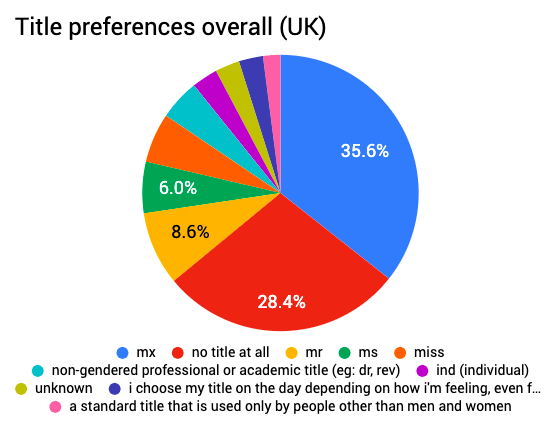
The age split between Mx and no title that we saw in the worldwide report was also present in the UK, with under-30s being more likely to prefer Mx and over-30s preferring no title:
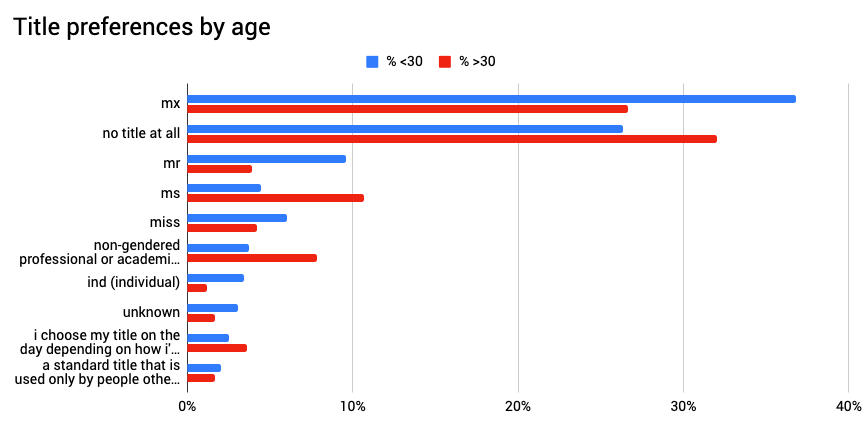
Here in the UK we are notoriously fond of honorific titles. Based on responses to previous reports I’ve learned that it’s unusual for titles to be required on forms in, for example, the USA – but in the UK it’s common enough that I am often pleasantly surprised when a form’s title field is optional. This might explain why Mx is so much more popular than no title at all in the UK responses compared to the international responses.
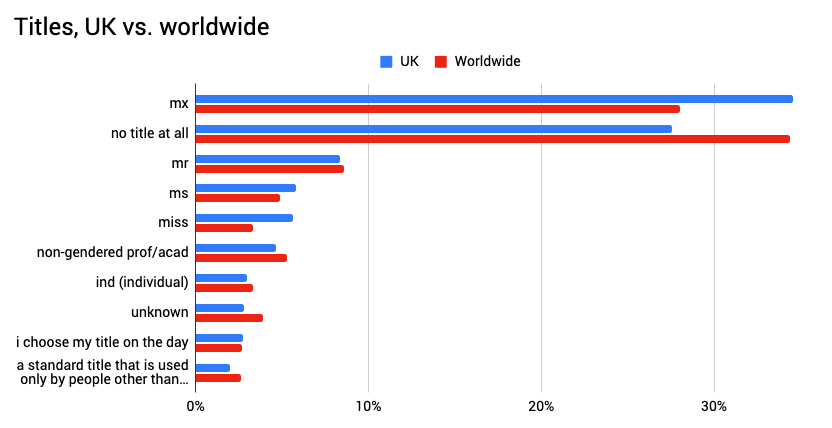
When just over a quarter of us would prefer to have no title at all, UK activists need to make sure they’re calling for titles to be optional in records to ensure nonbinary inclusion.
Q3. Pronouns
This was actually a complex set of questions, starting with Supposing all pronouns were accepted by everyone without question and were easy to learn, which pronouns are you happy for people to use for you in English? This was accompanied by a list of pre-written checkbox options. It included “a pronoun set not listed here”, and if you chose that it took you to a separate set of questions that let you enter up to five additional pronoun sets in detail.
Here’s our top 5:
- Singular they – they/them/their/theirs/themself – 76.0%
- She – she/her/her/hers/herself – 29.0%
- He – he/him/his/his/himself – 27.8%
- Avoid pronouns / use name as pronoun – 12.9%
- Mix it up – 12.3%
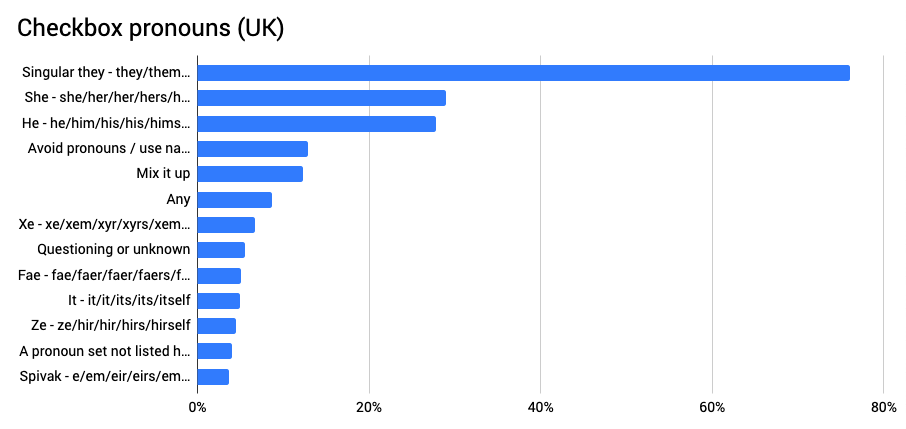
There was so little difference between the UK responses and the worldwide responses for the checkbox pronouns that it’s not even worth putting a graph here! For all but two pronoun options there was less than 2% difference between the UK and worldwide percentages. Locally and globally, the most common number of pronoun sets selected or entered by participants was just one, and the most common pronoun chosen was singular they.
In the UK we are slightly more likely to ask people to avoid pronouns for us completely, and overall we are choosing fewer pronoun sets each compared to the rest of the world (1.6 each compared to 1.7 internationally).
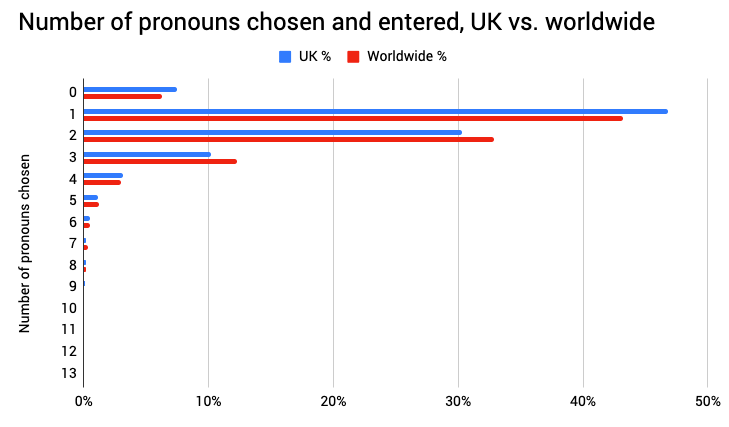
9.8% of participants aren’t comfortable with they, he or she.
Neopronouns
The checkbox list had some neopronoun sets in it, and they are all sets that continue to get over 3% internationally and so will remain in the checkbox list:
- Xe – xe/xem/xyr/xyrs/xemself – 6.7%
- Fae – fae/faer/faer/faers/faeself – 5.1%
- Ze – ze/hir/hir/hirs/hirself – 4.5%
- Spivak – e/em/eir/eirs/emself – 3.6%
Despite choosing they, he, she and any of the provided neopronouns less often than international respondents, people in the UK were also less likely to type in a set of neopronouns – 4% compared to 5.4%.
Our top 5 neopronouns entered into the textboxes were:
- ey/em/emself – 0.4% (11 people)
- ve/ver/verself – 0.3%
- ze/zir/zirself – 0.2%
- ae/aer/aerself – 0.2%
- ze/zem/zemself – 0.1%
Age and referrers
UK participants tended to be a little older – 21.5% of UK participants were over the age of 30, compared to 14.5% of worldwide participants. In fact, it swaps very cleanly at age 26+:
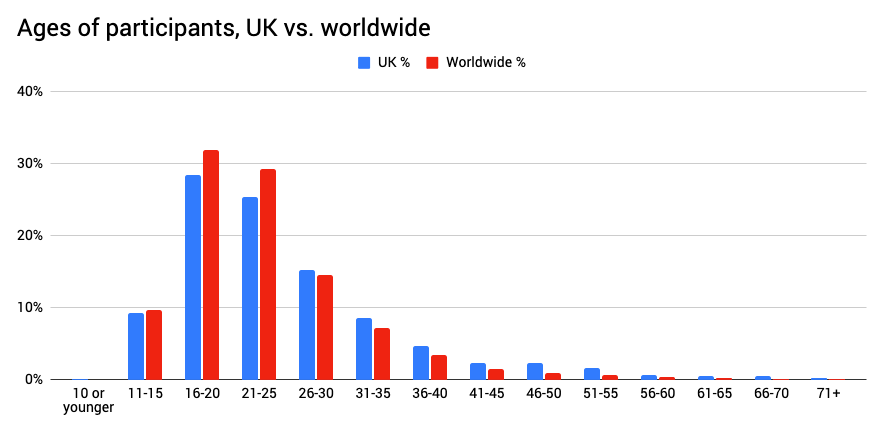
This is somewhat reflected in how people found the survey. Tumblr dominated the worldwide report, pulling in almost a third of all participants. In the UK the same percentage of participants came from “the big three” (Tumblr, Twitter and Facebook), but in the UK that 63%-ish was much more evenly distributed between them:
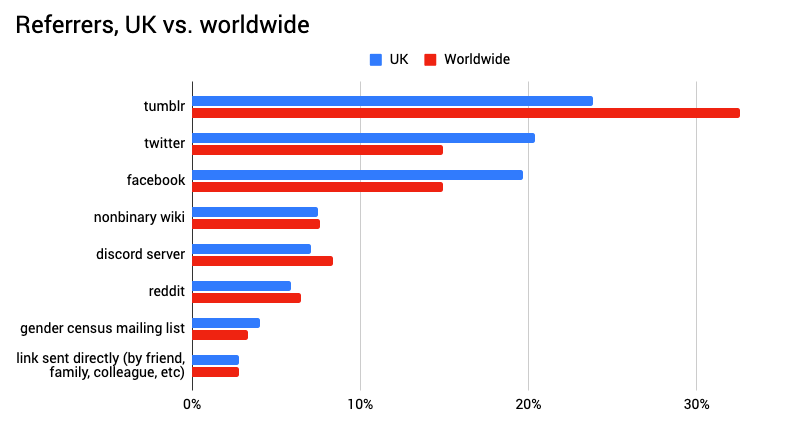
Since Tumblr users do tend to be a little younger than Twitter users and a lot younger than Facebook users, it makes sense that over-30s would be better represented here!
The questions I ask
- What should the third gender option on forms be called? – There is no consensus yet, and there might never be one. But nonbinary is in use by almost two thirds of us, which means it’s probably a good fallback if you’re not sure what else to call us as a group. Just make sure you give people the option to specify something else where appropriate.
- Is there a standard neutral title yet? – No. Mx is definitely the overwhelming preference at one third, but that is quite closely followed by no title at all. If you want to be inclusive, make sure that you include Mx and ensure that titles are optional.
- Is there a pronoun that every nonbinary person is happy with? Singular they is a good option for over three quarters of us, and has been reliably topping the chart by a similar margin for as long as this survey has been running, consistently more popular than the second place pronoun by at least 40%. Having said that, 1 in 10 of us isn’t comfortable with he, she or they. If you’re not sure how to refer to a nonbinary person and you can’t ask, they is a good fallback – but if you can ask, do so.
- Are any of the neopronouns gaining ground in a way that competes with singular they? No. Xe/xem/xyr/xyrs/xemself got a little under 7%, but to put that in context, traditional binary-gendered pronouns he/him and she/her both got entered by just under 30% each. Pronouns are a closed class in English, which means it takes a very long time to add new pronouns, potentially even several generations. It could be a while before we see a neopronoun really permeate the nonbinary community.
Corrections
2021-12-18: Changed the order of the checkbox neopronoun sets so that they’re in % descending order.
2020-11-13
email: hello@gendercensus.com